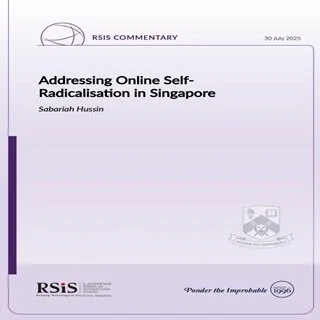By Sabariah Hussin
SYNOPSIS
The evolving nature of online self-radicalisation in Singapore raises pressing concerns that go beyond traditional counterterrorism frameworks. While Singapore’s preventive strategies are largely effective, emerging digital dynamics and psychosocial vulnerabilities call for more spiritually grounded, trauma-informed, and community-empowered approaches.
COMMENTARY
The issue of youth radicalisation is gaining attention in Singapore. During a speech by Acting Minister for Muslim Affairs, Faishal Ibrahim, at the Religious Rehabilitation Group (RRG) retreat on 24 June 2025, he noted that the availability of extremist content and the emergence of ideologically themed online communities have contributed to a gradual increase in radicalisation among young people. Given that many of these individuals are still developing their identities and critical thinking skills, they may be more susceptible to these influences.
It is concerning that a 17-year-old supporter of far-right ideology was reportedly planning a mass shooting of worshippers attending Friday prayers, while a 15-year-old girl expressed a desire to marry an ISIS fighter and engage in combat overseas. Both cases illustrate the phenomenon of self-radicalisation occurring entirely through online platforms.
These developments highlight a significant and rapid evolution in the patterns and scope of radicalisation, necessitating a thorough reassessment of Singapore’s CVE (countering violent extremism) strategies.
S. Rajaratnam School of International Studies, NTU Singapore, 2025. 6p.



